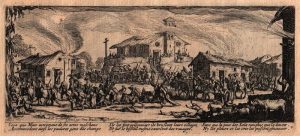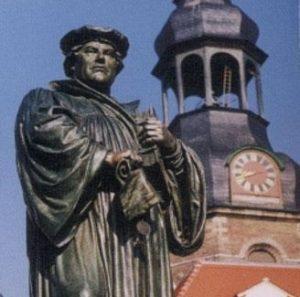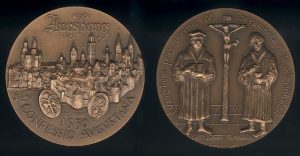During the Thirty Years War (1618 – 1648) and in its aftermath, jubilees were held on a smaller scale
Although the Reformed States had participated to a certain degree in the 1617 jubilee, it was only the Lutheran states who continued such celebrations during the XVIIth century and the Reformed states were never invited to take part.
From the 25th to the 27th June 1630, the centenary of the Confession of Augsburg was celebrated as an “Evangelische Jubelfest” (a jubilee of the Evangelical Church), that is to say, of the Confession of Augsburg; as in 1617, it was held in Saxony but also in other Lutheran territories. Nonetheless, during the Thirty Years War, the jubilees were held on a smaller scale.
The jubilee of 1667 (150th anniversary of 1517), decreed by the Prince Elector of Saxony John George II, was more consequential. He fixed the date of the 31st October as an annual anniversary of the Reformation, although it was not considered a religious holiday and was often held on the preceding or following Sunday.
In 1717, the Reformed states were invited to take part in the jubilee
It’s only in 1717 that the Reformation Jubilee was held on the same lines as that of 1617, in most of the Lutheran territories and in Denmark. But Saxony participated to a lesser extent as the Prince Elector Frederick Augustus I had converted to Catholicism in 1697.
It is interesting to note that at the 1717 jubilee the Pietist Lutherans considered Luther as a man of piety and their duty was to follow in his footsteps, while orthodox Lutherans saw their hero as someone who had crushed mediaeval superstition and the papacy; many German universities celebrated other reformers and “witnesses to the truth” in addition to Luther. What’s more, the controversy with the Reformed Church became less virulent and the two Protestant Churches began to draw closer together in their struggle against Rome.








